|
|
|
Sort Order |
|
|
|
Items / Page
|
|
|
|
|
|
|
| Srl | Item |
| 1 |
ID:
147712
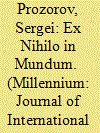

|
|
|
|
|
| Summary/Abstract |
In this reply to Vassilios Paipais’s review of my Void Universalism books I focus on two main points of my disagreement with Paipais. The first concerns the possibility of deriving universalist axioms of world politics from the ontology of the void discussed in the first volume, Ontology and World Politics. While Paipais rejects such a possibility and posits a contentless ontology of the political, I argue that it is possible to derive from void ontology the political axioms of community, equality and freedom understood as attributes of indiscernible ‘whatever being’. The second pertains to the limitations on the world-political subject addressed in the second volume, Theory of the Political Subject. While Paipais is entirely correct in arguing that my notion of political subjectivity combines purism on the level of content with prudentialism with regard to form, I demonstrate that this combination is not a contradiction but is rather the precondition of politics as free praxis, whereby the politicisation of particular worlds in accordance with universal axioms always remains up to the subject.
|
|
|
|
|
|
|
|
|
|
|
|
|
|
|
|
| 2 |
ID:
182653
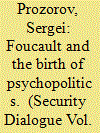

|
|
|
|
|
| Summary/Abstract |
The article contributes to the genealogy of current tendencies in crisis governance by reconstructing Michel Foucault’s analysis of the application of the notion of crisis in 19th-century psychiatry. This analysis complements and corrects Reinhart Koselleck’s history that viewed crisis as originally a medical, judicial or theological concept that was transferred to the political domain in the 18th century. In contrast, Foucault highlights how the psychiatric application of the concept of crisis was itself political, conditioned by the disciplinary power of the psychiatrist. Unlike the ancient medical concept of crisis that emphasized the doctor’s judgement in observing the event of truth in the course of the disease, psychiatric crisis is explicitly forced by the doctor in order to elicit the desired symptoms in the patient and convert their power of disciplinary confinement into medical diagnosis. The article argues that this notion of crisis resonates with the tendencies observed in contemporary crisis governance in Western societies. While these tendencies are often addressed in terms of ‘psychopolitics’ that presumably succeeds Foucault’s ‘biopolitics’, we suggest that Foucault’s own work on psychiatric power offers a valuable genealogical perspective on the contemporary governance of crises.
|
|
|
|
|
|
|
|
|
|
|
|
|
|
|
|
| 3 |
ID:
157099
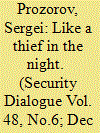

|
|
|
|
|
| Summary/Abstract |
The article addresses the reinterpretation of the problematic of security in the messianic turn in contemporary continental political thought. I focus on Giorgio Agamben’s reinterpretation of Hobbes’s Leviathan in Stasis, which restores an eschatological dimension to this foundational text of modern security politics. Hobbes’s commonwealth has been traditionally read as a secularized version of the katechon, a force that restrains the state of nature while drawing on its resources. Instead, Agamben argues that for Hobbes, the state is neither the analogue of God’s kingdom on earth nor the katechon that delays its arrival, but the profane power that will disappear when the kingdom of God is established on earth. It is thus in principle incapable of attaining the peace and security that it claims to provide, perpetually producing insecurity and violence in the guise of protection. In Agamben’s reading, it is precisely this failure of the state’s security apparatuses that assists the advent of the messianic event in an oblique fashion. The exposure of this failure does not aspire to the improvement of the apparatuses of security or resign us to inescapable insecurity but only affirms the need to render the present apparatuses inoperative, bringing forth a future without them.
|
|
|
|
|
|
|
|
|
|
|
|
|
|
|
|
| 4 |
ID:
122994
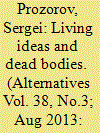

|
|
|
|
|
| Publication |
2013.
|
| Summary/Abstract |
Aside from casual references to Soviet biopolitics in the work of Foucault, Agamben, and Esposito, the theoretical literature on biopolitics has largely ignored the Soviet experience, while empirical research in Russian studies has rarely addressed biopolitics. The article examines the experience of Stalinism as an important case for the study of biopolitics that helps resolve a problem preoccupying scholars from Foucault onward: the proximity of biopolitics to its opposite, the thanatopolitics of the mass production of death. How is it that a mode of power presenting itself in terms of care, augmentation, and intensification of life so frequently end up negating life itself? The article addresses this question in the context of the confluence of two political rationalities in the project of Soviet socialism, the revolutionary transcendence of the old order and the biopolitical immanentism of the construction of new forms of life. Focusing on the catastrophic policies of the Great Break (1928-1932), it argues that this combination is ultimately aporetic, leading to the violent destruction of the very lives that were to be transformed. The conclusion considers the contemporary relevance of the lessons to be learnt from Stalinist biopolitics.
|
|
|
|
|
|
|
|
|
|
|
|
|
|
|
|
| 5 |
ID:
105649
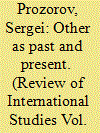

|
|
|
|
|
| Publication |
2011.
|
| Summary/Abstract |
The article ventures a critique of the logic of 'temporal othering' in contemporary International Relations (IR) theory. Originally articulated in the field of European integration, this logic presupposes a possibility for a political community to constitute its identity without any spatial delimitation by means of casting as Other its own past, whose repetition in the future it seeks to avoid. While the image of contemporary Europe as 'othering' its own past has been subjected to empirical criticism, this article makes a conceptual argument for the indissociability of temporal and spatial aspects in any act of othering. Drawing on Alexandre Kojève's reading of Hegel, I argue that any historical action is necessarily spatiotemporal, combining the abstraction of temporal negation with the concrete actuality of a negated spatial being. Alternatives to the logic of sovereign territoriality are therefore not to be sought in the temporal aspect of othering, but rather by pursuing the possibility of self-constitution in the absence of any negating action whatsoever. The article concludes with an outline of such an alternative ethos, developed on the basis of Giorgio Agamben's reconstruction of the Hegelian-Kojèvian problematic of the end of history and his theory of the subject.
|
|
|
|
|
|
|
|
|
|
|
|
|
|
|
|
| 6 |
ID:
174707
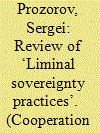

|
|
|
|
|
| Summary/Abstract |
I recommend that the article should be revised and resubmitted. This is a very well-written and clearly argued piece that offers a systematic and analytical treatment of the concept of liminality that the authors suggest as an alternative to the binary inside/outside thinking that characterizes both the traditional international relations (IR) theory and its post-structuralist critique that remains fixated on the dividing line between the inside and the outside, even as it affirms its contingency, fluidity, haziness, and so on. While the authors’ argument, particularly their typology of liminal practices, is very interesting and suggestive, I am not certain that it succeeds in solving the problems the authors claim it does, at least on the level they claim it does. Below I address three problems with the argument.
|
|
|
|
|
|
|
|
|
|
|
|
|
|
|
|
|
|
|
|
|